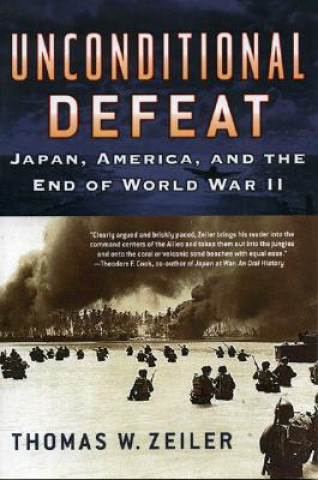
Code: 04942540
Unconditional Defeat
by Thomas W. Zeiler
Unconditional Defeat-the second book in a Pacific War trilogy that is part of SR Books' Total War series-examines the concluding stages of World War II in Asia and the Pacific, from November 1943 until September 1945. Thomas W. Ze ... more
- Language:
 English
English - Binding: Paperback
- Number of pages: 223
Publisher: Rowman & Littlefield, 2003
- More about this

200.66 zł
RRP: 211.16 zł
You save 10.50 zł
Availability:
50/50 We think title might be available. Upon your order we will do our best to get it within 6 weeks.
We think title might be available. Upon your order we will do our best to get it within 6 weeks.We search the world
You might also like
-

Self - Organization in Sensor and Actor Networks
569.46 zł -3 % -

Valid Analytical Methods and Procedures
313.29 zł -

Strange Death of Labour Scotland
745.35 zł -

Skilled Migration, Expectation and Reality
778.49 zł
Give this book as a present today
- Order book and choose Gift Order.
- We will send you book gift voucher at once. You can give it out to anyone.
- Book will be send to donee, nothing more to care about.
Availability alert
Enter your e-mail address and once book will be available,
we will send you a message. It's that simple.
More about Unconditional Defeat
You get 117 loyalty points
 Book synopsis
Book synopsis
Unconditional Defeat-the second book in a Pacific War trilogy that is part of SR Books' Total War series-examines the concluding stages of World War II in Asia and the Pacific, from November 1943 until September 1945. Thomas W. Zeiler argues that this "war without mercy" could only come to one conclusion: the complete, unconditional defeat of Japan by a mobilized, overwhelming, vengeful United States. Zeiler describes these final 22 months of the Pacific War as a story of contrasts. While the U.S. launched a methodical, smothering attack with all the means at its disposal, Japan fought a fierce yet hopeless defense with diminishing supplies. By November 1943, Japan lacked the necessities not just for victory, as in the earlier phases of the war, but for adequate defense. The Japanese had no options. The strategic planning rested with the Americans. Zeiler's gripping and thorough overview discusses other contrasts between the two foes. The Americans planned multiple advances in the Pacific Ocean and on the Asian mainland. They used a massive number of troops, devised and adopted new amphibious techniques, and deployed the new nuclear category of weapons. The Japanese stubbornly but desperately clung to their territory, often with the basest of defenses. By August 1945, the United States' forces at sea, on land, and in the air had brought Japan near complete defeat. In addition, the Japanese Empire was diplomatically isolated. Japanese politics was in turmoil, the government faced rebellion, and the Emperor stood on the brink of extinction. Wracked by the destruction of the homeland from the air and blockade by sea, Japanese society veered near chaos and the people peered into the abyss of an uncertain future. In the meantime, America's military had experienced such horrors at the hands of Japan that the U.S. made the difficult decision to unleash the atomic bomb. Despite the stark differences between the U.S. and Japan, argues Zeiler, there was one aspect of the war that both sides held i
 Book details
Book details
Book category Books in English Humanities History Regional & national history
200.66 zł
- Full title: Unconditional Defeat
- Author: Thomas W. Zeiler
- Language:
 English
English - Binding: Paperback
- Number of pages: 223
- EAN: 9780842029919
- ISBN: 0842029915
- ID: 04942540
- Publisher: Rowman & Littlefield
- Weight: 368 g
- Dimensions: 155 × 229 × 14 mm
- Date of publishing: 01. December 2003
Trending among others
-

Hundred Years' War on Palestine
57.71 zł -15 % -

Ethnic Cleansing of Palestine
61.24 zł -15 % -

History of Japan
81.39 zł -4 % -

Ten Myths About Israel
55.40 zł -10 % -

Strange Death of Europe
70.20 zł -14 % -

Decline and Fall of the Roman Empire
25.07 zł -26 % -

Secret History
51.97 zł -23 % -

God's Playground A History of Poland
291.83 zł -

Mayflower
81.69 zł -5 % -

How to be a Victorian
51.87 zł -23 % -

Plantagenets
61.14 zł -23 % -

General's Son
85.62 zł -5 % -

Iran: A Very Short Introduction
57.71 zł -5 % -

Temples of Karnak
651.97 zł -

Cuneiform
47.34 zł -23 % -

Twenty Years A-Growing
42.70 zł -23 % -

China in Africa
155.53 zł -

Bohemian Paris
81.49 zł -5 % -

History of Witchcraft in England from 1558 to 1718
78.97 zł -

Islandman
53.38 zł -9 % -

Lancaster And York
89.04 zł -1 % -

Alexiad
89.75 zł -4 % -

Modern France: A Very Short Introduction
57.71 zł -5 % -

Inside Hitler's Greece
100.12 zł -9 % -

Diana: Her True Story - In Her Own Words
52.37 zł -15 % -

The Fourth Turning
77.26 zł -14 % -

The Oxford History of Ancient Egypt
65.87 zł -23 % -

Churchill: The Power of Words
70.20 zł -14 % -

Palestine
91.36 zł -14 % -

Korean History in Maps
133.57 zł -5 % -

Great Gatsby (Wisehouse Classics Edition)
32.73 zł -70 % -

Viking Way
196.43 zł -6 % -

The Thirteenth Tribe
59.42 zł -

My Promised Land
61.24 zł -15 % -

Vanished Kingdoms
87.93 zł -14 % -

Age Of Revolution
70.41 zł -23 % -

Life and Death of Anne Boleyn
100.43 zł -2 % -

Coming of the Third Reich
79.47 zł -23 % -

Children of Ash and Elm
78.97 zł -14 % -

Europe Between the Oceans
140.42 zł -10 % -

Socialism Betrayed
97.30 zł -5 % -

303 Squadron
79.47 zł -23 % -

Ancient Celts, Second Edition
133.57 zł -5 % -

Dancing in the Glory of Monsters
81.49 zł -5 % -

Battle of Britain: Luftwaffe Blitz (Images of War)
112.41 zł -6 % -

Age of Confucian Rule
139.41 zł -

Beyond Band of Brothers
70.41 zł -23 % -

Benjamin Franklin
70.41 zł -23 % -

On China
78.97 zł -14 %
safisfied customers
Since 2008, we have served long line of book lovers, but each of them was always on the first place.
Copyright! ©2008-24 libristo.pl All rights reservedPrivacyPoučení o cookies


 21 million books
21 million books Delivery 12.99 zł
Delivery 12.99 zł (32) 444 93 66 (8-15.30h)
(32) 444 93 66 (8-15.30h)